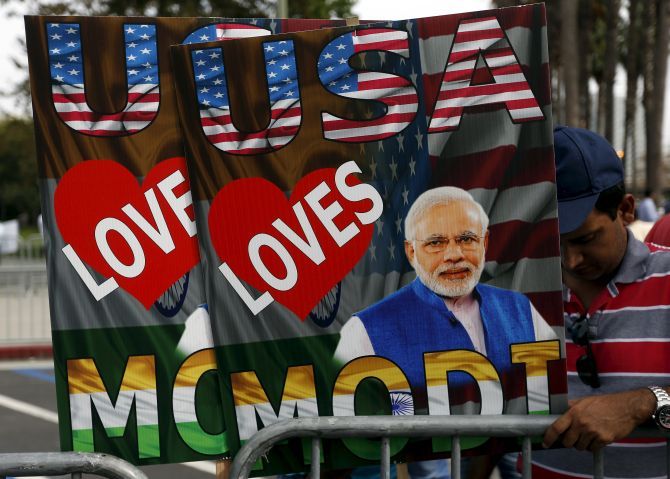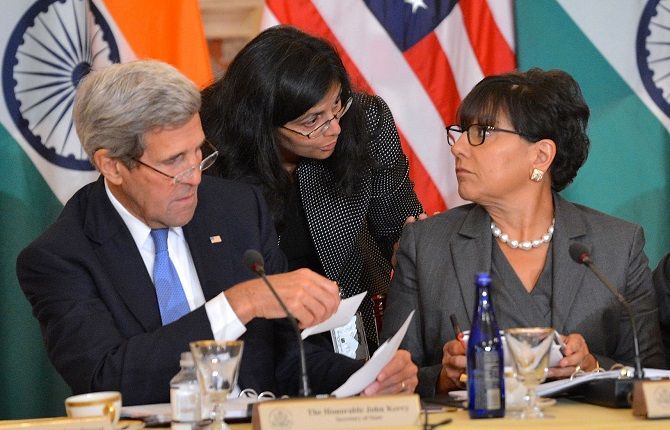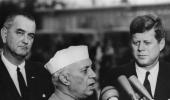'... For the India-US relationship to continue its positive trajectory, it will require India to adapt to a different approach.'
Nisha Desai Biswal -- who as the Obama administration's point person for South Asia was in the inner circle of all the Obama-Modi Summits -- tells Rediff.com's Monali Sarkar why she is hopeful that India and the US are on an irreversible forward course.

Photograph: Stephen Lam/Reuters
Despite the hiccups preceding the meeting between Prime Minister Narendra Modi and United States President Donald Trump on June 26, Nisha Desai Biswal believes both India and the US recognise the tremendous potential for collaboration and economic cooperation to create opportunities in both countries. And that, she says, will keep the partnership on course.
Biswal speaks from nearly three decades of experience in South and Central Asian Affairs.
She served as Assistant Administrator for Asia at the US Agency for International Development.
Then, as the Obama administration's Assistant Secretary of State for South and Central Asian Affairs, she not only formulated US foreign policy and managed relations with Bangladesh, Bhutan, India, Kazakhstan, Kyrgyzstan, Maldives, Nepal, Sri Lanka, Tajikistan, Turkmenistan, and Uzbekistan but also had a ringside view of the eight meetings between Modi and US President Barack Obama.
Biswal, who now a senior advisor with the Albright Stonebridge Group, a commercial diplomacy firm led by former US secretary of atate Madeline Albright shares her insider perspective on the Modi-Trump Summit.
Trump's campaign stand on China, Pakistan and Islamic extremism had made many in India view his ascent to the presidency in a positive light. But that perception is beginning to dissipate amid his interactions with China, Pakistan, Saudi Arabia.
It is also telling that Trump did not nominate an ambassador to India till this week nor has the administration named your successor.
Based on all that has happened since January 20, where do you believe Trump and his team stand on the India question?
Do you expect anything tangible from the June 26 summit?
I think the initial euphoria in some circles around the election of Donald Trump was premature and based on conjecture rather than sound analysis.
In the last few months, we have had more insight into President Trump's priorities and approach to foreign policy.
We have seen that he tends to focus more on short-term transactions rather than long-term strategic goals.
This is not necessarily to India's advantage.
The US-India relationship has flourished under a recognition of India's strategic importance in maintaining an open and rules-based architecture in the Asia-Pacific.
But a Trump administration that is focused on its immediate crises at home and abroad may be looking more at how India can contribute to its short-term priorities.
That said, I know that colleagues in the White House, and at State and the Department of Defence value the partnership with India and are looking for ways to deepen the relationship.
The pick of Kenneth Juster for US ambassador to India is also an indication of the importance of the relationship.
So, I suspect that there is plenty of scope for the relationship to continue its positive trajectory, but it will require India to adapt to a different approach.
Given that there is usually a script when heads of States meet, how much weightage do you ascribe to the rapport between leaders when it comes to the final outcome?
The personal chemistry and rapport between leaders is always important and perhaps even more so with this President, who seems to put a great deal of stock in his personal relationships.
I think you saw that during the President's interactions with Japan's President Shinzo Abe and China's President Xi Jinping.
PM Modi is a very charismatic leader, and I suspect will develop his own personal relationship with President Trump.
I think the team preparing for the visit on both sides are working hard to ensure that happens.
Beyond the hugs and photo-ops, how genuine was the Modi-Obama camaraderie?
Having observed it up close, I would say that there was indeed a deep camaraderie and personal bond between President Obama and PM Modi.
They may not have agreed on every issue, but I think the two men respected and admired each other.
The Republic Day visit was a reflection of that bond.
The relationship with President Trump will be different, but can still be beneficial for both.
At the time of the 2014 Modi-Obama summit, you had said that the US recognised Modi's domestic transformation priority and hoped to collaborate with India to make that happen.
Do you believe that could still be the case or do you see Modi's India First and Trump's America First campaigns clashing for the next four years?
I hope the two countries recognise the tremendous potential for collaboration and economic cooperation to benefit both societies, to create opportunities in both countries.
The US has always been for America First -- but our understanding of America First has not been through a zero-sum lens that pits us against our partners and allies, but rather through the lens that America benefits when we create stability and opportunity around the world.
Both countries have to pursue policies that create jobs and grows their economies.
Both countries need to pursue policies that allow for collaboration, innovation and job creation.
India must open up its economy and reduce trade barriers, and the US needs to reassert its leadership on trade and welcome Indian investment as well as Indian talent into the American economy.

Photograph: US State Department
What do you think are the repercussions of Trump's remarks -- in terms of the optics and beyond it -- about India in relation to the Paris Agreement?
I think this was a misstep, largely for domestic political effect, and it created unnecessary friction.
But India has handled it maturely and moved beyond it.
American companies are the ones that will suffer if we alienate or rebuff India on climate change.
India has the most ambitious targets for clean energy and represents that largest market for green infrastructure.
You have said that you believe cooperation between India and the US on climate change issues will continue despite Trump pulling out of the Paris Agreement?
Do you have similar faith regarding the survival of other US-India collaborations in the Trump years?
In every new administration, some things will remain, and some new initiatives will emerge.
I expect the defence and counter-terrorism cooperation to move forward smoothly.
On the Strategic & Commercial dialogue, Energy Dialogue, and myriad other dialogues that reflect the broad and comprehensive nature of our partnership, I think the Trump administration may have a different view and may restructure some of these dialogues.
What is your assessment of the geopolitical direction in Asia, especially South Asia, in the Trump years?
What role do you think the Trump administration has in mind for India?
It is too early to write the book on the Trump years. Much of its foreign policy has yet to be crafted.
While there may have been some early missteps, they were not major.
The US-India relationship is important to both countries, and that is accepted on both sides. But how much the two leaders prioritise this relationship above others remains to be seen.
In the Obama administration you saw the extraordinary importance both governments placed with eight leader level interactions, and intensity of engagement across the cabinet.
Be it the narrative against immigrants in the US or unchecked issues like gau rakshaks and lynch mobs in India, domestic politics in both countries have taken a disconcerting turn in the past year.
Trump's silence after attacks on minorities in the US echoes Modi's silence on the issue.
As an Indian American, how do you view all this?
Nativist and nationalist sentiments that are so much on display in the US, in India and around the world are not new, but have always been on the fringes of the political and social lexicon. But what is troubling is when political leaders enable and give legitimacy to these fringe sentiments for political gain.
There are real concerns and legitimate grievances that are the cause of frustration in many poor urban and rural communities in the rust belt and farm belt.
The changing economic and demographic composition of the country has created a great deal of innovation and opportunity, but it has also caused economic dislocation.
Rather than scapegoating the minority or immigrant population, we should be having a national dialogue on how government, industry and academia can work together to help create the solutions to the challenges this poses.
In his speech to the joint session of the US Congress last year, Modi had spoken about India-US ties overcoming the 'hesitations of history'.
But the expectations from the upcoming summit seem to be so low that those hesitations might as well be back.
What is your take on this?
I think that speech was a bold vision and articulation of the growing strategic and economic convergence that is defining and shaping the trajectory of this relationship.
I don't think we will revert to the status quo ante.
But the relationship needs constant tending, and the current administration has been slow to engage.
Let's give it some time -- I am still hopeful that we are on an irreversible course.
Modi-Trump Meet: What the Pundits Say










